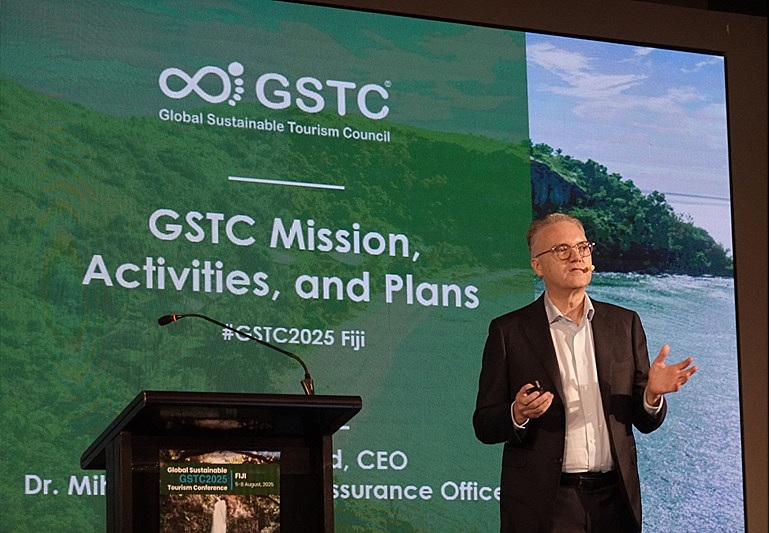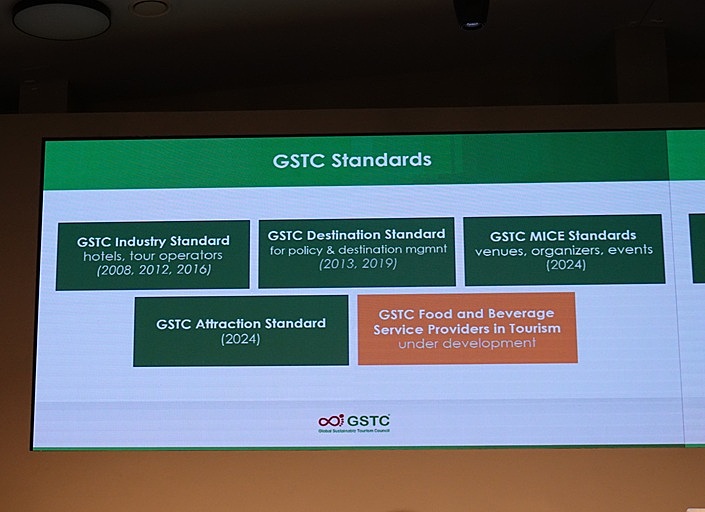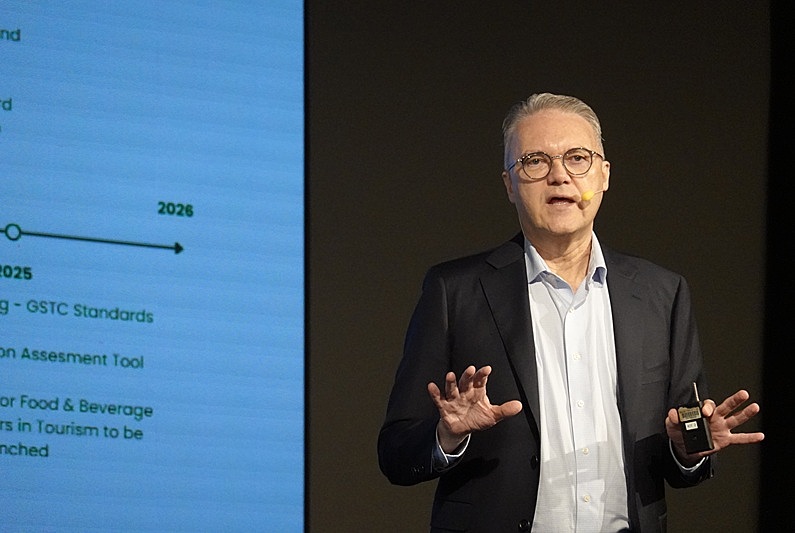
Randy Durband, CEO of Global Sustainable Tourism Council (GSTC), talked about the current challenges against sustainable tourism and a roadmap to solve them at GSTC 2025 international conference in Fiji.
Durband said that sustainable tourism is both a process and a goal, but complete sustainable tourism does not exist yet, implying a sense of crisis over the proliferation of certifications and standards in the global tourism industry.
GSTC was established in 2007, when the United Nations Environment Programme (UNEP) and the United Nations World Tourism Organization (UN Tourism today) conducted the first comprehensive analysis and definition of tourism and environmental sustainability. Since then, GSTC has been creating criteria for sustainable tourism, based on he principles that lead from the Millennium Development Goals (MDGs) to the Sustainable Development Goals (SDGs).
From Criteria to Standard
In the meantime, GSTC has changed from ‘GSTC Criteria’ previously to ‘GSTC Standard. Durband said GSTC decided to officially call it a "Standard" to clarify that it was designed in accordance with an international standard framework.
‘GSTC Standard’ is developed for hotels, tour operators, MICE and attractions and is expected to be extended to food&beverage and service providers.
 GSTCスタンダード(規格)
GSTCスタンダード(規格)
What is a standard that can be used globally?
The most distinctive feature of the GSTC Standards is their thoroughly inclusive development process. GSTC collects voices from all continents and cultures in order that a technical committee organizes and prioritizes the input.
Durband said that our open process for anyone is what makes our standards global standards.
Revisions are typically made every five to six years, but any changes are not made if unnecessary. Durband added that frequent revisions would cause the entire industry to fall behind. It is important to strike a balance between effectiveness and stability.
Regenerative tourism and net positive
Referring to ‘regenerative tourism’ and ‘net positive’ as the latest trends in the tourism industry, Durband said, “If net zero means ‘zero negative impacts,’ then net positive means ‘the positive impacts outweigh the negative impacts.’ However, we haven't even reached net zero yet.”
One of the challenges is that measurement and definition of regeneration is still uncertain, while regeneration is regarded as an ideal. “We should use the word more carefully,” Durband said. “Sustainable tourism should be a continuous process of striving for improvement in all forms of tourism.”
 GSTCのランディ・ダーバンドCEO
GSTCのランディ・ダーバンドCEO
Concerns about reliability for scattered certificates
Approximately 300 sustainability certifications seems to exist in the tourism industry worldwide. However, most of these are a combination of "self-assessment" or "consultant guidance and audits," and the majority do not meet the standards of international certification systems.
“It does not happen in other industries,” Durband said. “Safety and quality certifications always require third-party audits and evaluations, which underpin their reliability.”
Under the circumstances, GSTC launched its official accreditation system in 2016 and promotes it as a world-stranded and reliable certification.
Criteria, measurement and verification for sustainable tourism
GSTC thinks that criteria, measurement and verification are essential to drive sustainable tourism systematically.
The service industry is not good at measurement, Durband said, expecting the development of a measurement data infrastructure by OTAs, including Travalyst. He emphasized that it is the time for the entire industry to seriously address the need for rigorous third-party evaluation and accreditation.
It is also important for tourism players and regions to make step-by-step efforts toward ‘complete sustainability’ in the future, GSTC suggests that the goal is to meet 30% of GSTC standards by 2026, then 70% within a few years, and ultimately achieve certification.
GSTC offers training programs and courses in 19 languages and is also collaborating with private and public partners, including Agoda, Traveloka, Virgin Voyages, and the Japan Tourism Agency.
For tourism industry relied in the world
“For 30 years, the tourism industry has tolerated certification labels without external review. This must change it,” Durband said. The development of an internationally recognized certification and evaluation process must increase the overall credibility and effectiveness of the tourism industry, he added.
For real sustainable tourism, ‘integrity’ and ‘systematization’ are required.





